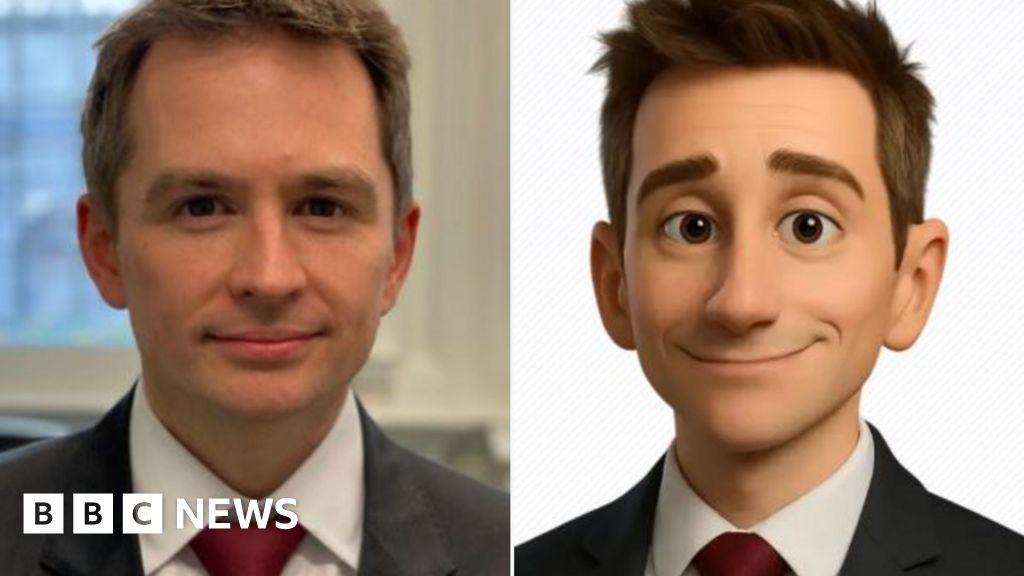UK MP Mark Sewards Pioneers AI Chatbot Clone, Sparking Debate on Political Accessibility and AI Ethics
5 Sources
5 Sources
[1]
Mark Sewards becomes first MP to create himself as an AI bot
With chatbot encounters becoming increasingly commonplace in our daily lives, one MP has become the first UK politician to create an AI version of himself to interact with constituents. Labour's Mark Sewards has worked alongside a startup AI firm to create a virtual representation of himself, using his voice and allowing people to ask for help with local issues or policy queries. The West Yorkshire representative says it will "help strengthen the connection between an MP's office and the constituents we serve", but some are questioning whether the step creates further disconnect between politicians and the public.
[2]
A politician made an AI clone of himself. The outrage was real.
British lawmaker Mark Sewards released an artificial intelligence prototype of himself to help deal with a backlog of queries from constituents. Some weren't impressed. When Mark Sewards was elected to the British Parliament last year, the freshman lawmaker admitted he was having a hard time managing the more than 6,000 messages he received in just his first three months. "I've tried my best to sit at my desk and answer all the requests that come through on my laptop, but it's not possible for one person to do that," Sewards, then 34, told the BBC. So he cloned himself. On Tuesday, Sewards became what he said was the first British member of Parliament to release an artificial intelligence prototype of himself. "I encourage any resident of Leeds South West and Morley to give AI Mark a try," the Labour Party politician wrote on X. "The AI revolution is happening and we must embrace it or be left behind." Not everyone was happy about AI Mark, however, with scores of people quickly and angrily responding to his social media post. "In effect it makes you even more inaccessible to your constituents than you already are," replied one. "You've done the near impossible and united everyone in thinking this is an awful, lazy, ecologically irresponsible idea," wrote another, referencing the hidden environmental costs of using AI chatbots. The real Mark Sewards could not immediately be reached for comment. But AI Mark was available, and even sounded like the former math teacher-turned-MP, Yorkshire accent and all. "This AI service is designed to assist in providing information, and facilitate communication with constituents but it does not replace the direct engagement that Mark has with the community," the chatbot said, echoing Sewards's social media posts. "I'm here to listen to your local and policy issues and pass your thoughts along to his team." The British MP isn't the first politician to provoke frustration with his adoption of AI, as lawmaking becomes just the latest in a long string of professions upended by the new technology. Swedish Prime Minister Ulf Kristersson has come under criticism this week for admitting that he regularly uses AI tools such as ChatGPT and French service LeChat as sounding boards for political decisions. "I use it myself quite often. If for nothing else than for a second opinion," Kristersson told Swedish financial newspaper Dagens industri. "What have others done? And should we think the complete opposite? Those types of questions." Some experts were alarmed. "The more he relies on AI for simple things, the bigger the risk of an overconfidence in the system. It is a slippery slope," Virginia Dignum, a professor of responsible artificial intelligence at Umea University, told Swedish newspaper Dagens Nyheter. "We must demand that reliability can be guaranteed. We didn't vote for ChatGPT." In Wyoming, a candidate in last year's mayoral election promised that if he were elected, he'd let an AI bot run the capital city of Cheyenne. Despite "AI for Mayor" posters and repeated assertions by the human candidate on the ballot paper that he was nothing more than a "meat avatar," the innovative campaign came up well short. A similar effort in England last year appears to have helped inspire Sewards's chatbot. In the constituency of Brighton Pavilion, "AI Steve" described himself as "the only candidate who can have a conversation with 45,000 constituents at the same time and form policies based on what's just been discussed." The human behind the MP campaign -- who promised to do things AI Steve couldn't, such as attend Parliament -- was a local businessman named Steven Endacott. He is the chairman of Neural Voice, the AI voice company behind Sewards's chatbot. Jeremy Smith, the company's CEO and co-founder, told the West Leeds Dispatch that the idea was to give constituents more access to their local MP, not less. "For too long, politicians have been out of reach for their constituents," he said. "There's only so many hours in a day. We are working with Mark to bring access to his office to the masses and to make him more accessible to the constituents of Leeds South West and Morley, by using revolutionary technology." Smith said he believed other politicians would soon follow suit. There are valid questions to be asked about the data and training used to build such AI systems as well as their capacity for hallucination, said Amy McLennan, an associate professor at the Australian National University's School of Cybernetics. But concerns over AI stirred by apocalyptic sci-fi films like "The Terminator" sometimes overshadow the technology's potential use as a helpful tool, she said. "Of course, if you're an MP, your constituents' fears are valid and need to be listened to and responded to," McLennan said. "There is a question around what is the best way to do that. Is it to stop using the technology? Or is it to seek input on what [its use] might best look like?" People who want to chat with AI Mark are quickly met with a greeting that raises some philosophical questions. "Hi, I'm AI Mark Sewards, Labour MP for Leeds South West and Morley," a voice very much like Sewards's says. "How can I help you today?" Of course, AI Mark Sewards is not actually the MP, which is part of the issue. In several conversations with a reporter for The Washington Post, the AI clone didn't make any missteps but was clunky and evasive at times. Asked what were the most important issues for Sewards's constituents, AI Mark said: "I don't have that information in my knowledge base." Asked what his top priority was, AI Mark did what most real politicians would do and hedged, listing "education, transport and the cost of living." A question about Palestinian statehood prompted a carefully worded response about the need for a two-state solution, although a follow-up query about a timeline for Britain's recognition of the state drew a blank. (Prime Minister Keir Starmer recently announced that Britain will recognize a Palestinian state in September unless Israel agrees to a ceasefire in Gaza, stops building settlements in the West Bank and commits to a two-state solution.) AI Mark also refused to comment when asked about President Donald Trump or even Starmer, though he was happy to discuss his support for local soccer team Leeds United. The Post asked if the artificial Mark ever disagreed with the real one. "As an AI, I don't have personal feelings or disagreements," the clone replied. "My role is to represent the views and policies of Mark Sewards."
[3]
I spoke to the AI avatar of a Leeds MP. How did it cope with my own Yorkshire accent?
Mark Sewards has launched a digital assistant but the results of my chat show the real deal have got nowt to worry about As anyone with even a trace of a regional dialect who has had to pay a parking fine can attest, voice recognition services can struggle with accents. Now, people in Mark Sewards' consistency are likely to find the same problem with his AI variant. A new chatbot, billed as the first AI version of an MP, responds in Sewards's voice with advice, support or by offering to pass on a message to his team - but only if it understands you. The website, a virtual representation of the MP for Leeds South West and Morley complete with a Pixar-style cartoon, was set up by a local startup to field questions from his constituents - some of whom have broad Leeds accents. So I was interested to see how "Sewardsbot" would handle a conversation with someone from only a couple of miles away from his constituency border. Summoning my "home" voice (the one I had before it was adulterated by university, several years living in London and too many chats with Guardian colleagues from East Sussex) I begin a conversation. "Hi. I'm AI Mark Sewards, Labour MP for Leeds South West and Morley, can I help you today?" the character says, in Sewards' voice. "Now then," I begin. My words appear on the screen in front of me, and while the bot doesn't initially seem to understand it as a greeting - "now then" simply means hello in most of Yorkshire - it fills the gap in the conversation, asking for my name and contact details. The AI version of Seward records all the conversations, with the aim that his team are able to pick out key topics being talked about by constituents - something that it has been criticised for. Speaking of key topics, I go straight in with something that is on many people's minds at the moment: the horrendous images and video coming out of Palestine. "Are you gonna do summat about Gaza? Y'ant got it right Mark, love," I say. Sewardsbot handles this well, understanding that I'm broadly talking about Gaza, though doing nothing to explain the government's position. A message on the website had warned me: "AI Mark is a prototype digital assistant - this is a work in progress and not everything it says should be taken as fact. All responses are AI-generated." I try a few other phrases, seeing if I can throw it off with colloquialisms, asking it if someone can call me but that I'm at work "nine while half five so I can't be ont' phone" until after, and telling it I was "chuffed" to have had a chip butty in a nice breadcake in his constituency. Its interpretation of my accent is terrible and much of it is transcribed as gobbledegook which would be unreadable. Unlike a human, it doesn't understand that the glottal stop used in front of words means "the", though it still manages to get the gist. So I decide to go bigger, with the kind of problem a constituency MP might be asked to solve - even if it's not their responsibility. "Me neighbour's lad's blocked't ginnel at't back wi an old settee and he won't do owt about it. If someone dun't come for it, it's going in't road," I say. I suspect Sewards himself would tell me to contact Leeds city council about flytipping, instead the AI advises me I need to speak to the police to report an abandoned vehicle. MPs aides across the country will no doubt be sighing in relief - they've got nowt to worry about just yet.
[4]
UK politician unveils dead-eyed, Pixar-looking AI doppelganger, telling constituents to 'give AI Mark a try' -- unsurisingly, it's rubbish
It's 3 am. You can't sleep. You're tossing and turning because you simply must speak to your MP to ask them what their favourite crisp flavour is. Or if they'd be up for reintroducing the death penalty. Or how they feel about the many pointless uses of AI that are being foisted upon us. Good news! Your MP might be asleep, but an unnerving homunculus pretending to be Mark Sewards, MP for Leeds South West and Morley, will be happy to help. Well, "help" is a strong word. Much like a real politician, AI Mark will really just give you the runaround. Sewards unveiled his AI doppelganger yesterday, saying that the "AI revolution is happening and we must embrace it to see how it can be useful, in all sectors". I could have saved him some time: it's not useful. In follow-up posts on social media, Sewards explained that the "prototype AI model offers my constituents an additional way to engage with their MP on local casework and policy issues". But when I tried to ask the unhelpful digital clone about the real Mark Sewards' views on AI, the very thing he's so keen to embrace, it refused to give me a single scrap of information. The one thing AI Mark was willing to tell me is that Mark Sewards was invested in securing more funding for state education. Which, you know, you'd hope from a Labour MP. OK, I thought, I'll ask it for the MP's views on education. An easy one. Something he cares about. Again, though, it refused to tell me anything. He also wouldn't answer my question about whether a potato would be more helpful. AI Mark is no fun at all. Really, AI Mark is simply a gussied up data collection tool, passing on questions and complaints to Sewards' team. Like an email inbox. An expensive email inbox with a pretty dodgy privacy policy. This policy allows Neural Voice, the AI company behind AI Mark, to retain your personal information for as long as is deemed necessary by Neural Voice. Since retaining all your information could arguably help train its AI model, it could just keep it forever, without even anonymising the data. Cool. If this sounds slightly familiar, it's because Neural Voice previously developed a creepy AI chatbot that it hoped would have a career in politics. AI Steve. "This is democracy reinvented," it said. It isn't, of course. It's just more data collection. Standing as an independent candidate, AI Steve created policies based on what it discussed with anyone with enough free time to waste their day chatting to it, which would have been relayed to Parliament by a flesh-and-blood proxy. 179 jokers voted for AI Steve, placing it dead last. But at least it was able to hoover up lots of data to the benefit of wealthy entrepreneur Steve Endacott -- the real Steve. Ultimately this glorified chatbot just benefits an AI company rather than UK voters, and its vocal detractors are understandably concerned about politicians telling people that we need to "embrace" AI. There are absolutely positive use cases for AI, but it's also had a devastating impact on education, and it's ushered in a troubling new era of disinformation and plagiarism. What does Mark Sewards think about that? I don't know. AI Mark wouldn't tell me.
[5]
A UK politician turned himself into an AI chatbot. Here's how it works
The British MP said his digital twin will enable constituents to reach him 24/7. Imagine being able to corral your local politician and grill them about their views, anytime you fancy - no appointments, no red tape. That's exactly what one British Member of Parliament has set out to achieve. Mark Sewards, a Labour Party politician who represents Leeds South West and Morley, has unveiled an artificial intelligence (AI) clone of himself that is designed to answer questions and assist with constituents' queries around the clock. "I'm very keen to explore how new technologies, such as AI, can help strengthen the connection between an MP's office and the constituents we serve," Sewards said in a statement. He encouraged his constituents to "give AI Mark a try" - but noted in an Instagram post that the tool isn't designed to replace his official duties. Rather, the idea is to provide a 24/7 service where constituents can raise local issues, ask about policy matters, or drop a message to their MP's office without waiting weeks for a formal reply. The bot "simply gives people another option to contact me, any time of day," Sewards wrote. How a tech firm cloned Sewards The Leeds-based startup Neural Voice developed Seward's AI twin, dubbing him the "UK's first virtual MP". The company says it uses cutting-edge neural voice synthesis and advanced natural language processing to help create voice AI assistants for phone systems and websites. It used voice recordings of Sewards in parliamentary sessions, social media profiles, and previous correspondences with constituents to create a digital double that mirrors his speaking style, tone, and mannerisms with uncanny accuracy, the company said. It hopes the new technology will make local politicians more accessible to their constituents. "For too long, politicians have been out of reach for their constituents," said Jeremy Smith, Neural Voice's CEO and co-founder. "The vast majority of people do not know the name of their MP, let alone their voice and what they stand for," Smith added. He believes this technology could soon become par for the course, with other MPs and even businesses potentially following suit in a bid to bridge the communication gap. Digital doubles in politics and business AI is increasingly being deployed in public-facing roles to overcome physical barriers and create constant feedback loops. Last year, the mayor of a Japanese city, Yokosuka, created an AI avatar of himself to improve communication with the thousands of English-speaking US Naval personnel based there. Meanwhile, a political outfit in Denmark called the Synthetic Party created an AI candidate called "Leader Lars" to stand in the country's 2022 elections, though the party did not win votes. The AI model, which the party says was fed with material from fringe political parties in Denmark dating back to 1970, was designed to engage with citizens who typically do not vote and to demonstrate AI's role in democracy. Companies in Poland and China have also experimented with having AI CEOs front their brands. Yet such tools can be repurposed to impersonate public figures without their approval, or to generate convincing fake personas that appear to be real public figures. High-profile deepfake scams have targeted Italian defense minister Guido Crosetto, US Secretary of State Marco Rubio, and several celebrities, including Taylor Swift and Joe Rogan, whose voices were used to promote a scam that promised people government funds. Deepfakes were created every five minutes in 2024, according to a report from think tank Entrust Cybersecurity Institute. Whether a digital doppelgänger can truly replace an in-person chat with a public figure remains to be seen, but back in the United Kingdom, Sewards believes it will be at least one promising option. "The AI revolution is happening and we must embrace it or be left behind," he said on the social media platform X.
Share
Share
Copy Link
Labour MP Mark Sewards becomes the first UK politician to create an AI version of himself, aiming to improve constituent communication. The move raises questions about political accessibility, AI ethics, and data privacy.
UK's First AI MP Clone Unveiled
In a groundbreaking move, Labour MP Mark Sewards has become the first UK politician to create an AI version of himself, dubbed "AI Mark"
1
. The virtual representation, developed in collaboration with Leeds-based startup Neural Voice, aims to strengthen the connection between the MP's office and his constituents in Leeds South West and Morley2
.
Source: Euronews
The Technology Behind AI Mark
Neural Voice utilized cutting-edge neural voice synthesis and advanced natural language processing to create Sewards' digital twin. The AI clone was trained using voice recordings from parliamentary sessions, social media profiles, and previous correspondences with constituents
5
. The result is a chatbot that mirrors Sewards' speaking style, tone, and mannerisms with remarkable accuracy.Intended Benefits and Functionality
Sewards encourages his constituents to "give AI Mark a try," emphasizing that the tool is designed to provide an additional channel for engagement rather than replace his official duties
2
. The AI assistant aims to:- Offer 24/7 accessibility for constituents to raise local issues and policy questions
- Provide immediate responses to queries
- Pass on messages to Sewards' team for further action
Related Stories
Public Reception and Concerns

Source: PC Gamer
The introduction of AI Mark has sparked a heated debate among constituents and the wider public. While some see it as an innovative approach to political engagement, others have expressed concerns:
- Accessibility: Critics argue that the AI clone might make the MP even more inaccessible, creating a barrier between the politician and the public
2
. - Environmental Impact: Some have raised concerns about the ecological footprint of AI chatbots
2
. - Data Privacy: The privacy policy of Neural Voice has come under scrutiny, as it allows the company to retain personal information indefinitely
4
. - Accent Recognition: Early tests reveal that the AI struggles with strong regional accents, potentially limiting its effectiveness
3
.
Broader Implications for Politics and AI
Sewards' initiative reflects a growing trend of AI integration in politics and public-facing roles. Similar experiments have been conducted in other countries:
- In Japan, a mayor created an AI avatar to communicate with English-speaking US Naval personnel
5
. - Denmark's Synthetic Party fielded an AI candidate called "Leader Lars" in the 2022 elections
5
.

Source: BBC
However, the rise of AI in politics also raises concerns about potential misuse, such as deepfake scams impersonating public figures
5
.As AI continues to evolve, the debate surrounding its role in politics and public engagement is likely to intensify, challenging traditional notions of representation and accountability in democratic systems.
References
Summarized by
Navi
[2]
[3]
Related Stories
AI Chatbot "DonBot" Created to Stand In for Congressman in Virginia Debate
08 Oct 2024•Technology

UK Technology Secretary's ChatGPT Usage Revealed: Implications for Government AI Adoption
14 Mar 2025•Policy and Regulation

Swedish Prime Minister's Use of ChatGPT Sparks Debate on AI in Governance
06 Aug 2025•Policy and Regulation

Recent Highlights
1
ByteDance's Seedance 2.0 AI video generator triggers copyright infringement battle with Hollywood
Policy and Regulation

2
Demis Hassabis predicts AGI in 5-8 years, sees new golden era transforming medicine and science
Technology

3
Nvidia and Meta forge massive chip deal as computing power demands reshape AI infrastructure
Technology





